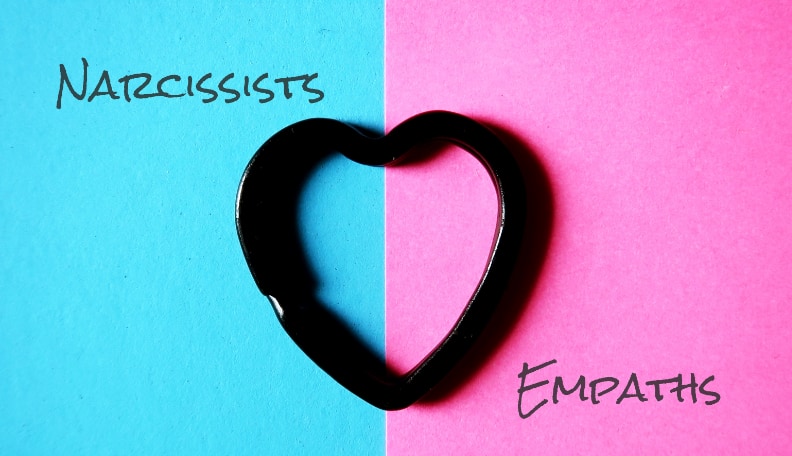Narcissist and Empath: Why They’re a Match Made in Dating Hell
A narcissist and empath go together like chalk and cheese. Yet, they’re strangely attracted to one another. The problem? It never ends well for the empath.

You’ve no doubt heard the line, “opposites attract.” But there is one instance in which that description will never fit—when a narcissist and empath cross paths.
If you want fireworks, declarations of lasting love, and a relationship that stands the test of time, you’re going to be sorely disappointed here.
The only destination this relationship heads toward is heartbreak, and not for the narcissist. If anything, it will almost certainly be the empath who ends up shattered, broken, and feeling everything a good person should never have to feel.
It’s not only toxic, it’s poisonous and emotionally damaging for the empath who feels everything so strongly compared to everyone else.
Put simply, you have one person who feels everything deeply and another person who feels nothing. The relationship is so out of whack it’s untrue. Yet, you also have one person who is cruel and manipulative, and another person who wants to help others.
Opposites may very well attract but these two are so completely different from one another and they can never find common ground.
To understand why this relationship is doomed from the start, first let’s learn what a narcissist and empath are. From those two descriptions, you’ll quickly be able to do the math!
[Read: Do opposites attract or push each other away?]
What is a narcissist?
A narcissist is a person who has very little, if any, empathy for other people. They are a professional manipulator and can be spotted easily by the following traits:
1. They are never in the wrong, and everything is always someone else’s fault
2. Their opinion is fact, and yours is categorical rubbish in their eyes
3. They struggle to show emotion and when they do, it’s often fake [Read: How to quickly spot narcissistic traits in a relationship]
4. An overinflated sense of self-importance
5. Often need validation and reassurance that they are the best/the most handsome or most beautiful/incredibly talented, etc.
6. Extremely jealous
7. Have a huge problem maintaining relationships and friendships
8. Often uses emotional manipulation to get their own way, especially gaslighting [Read: How to quickly spot gaslighting in a relationship and shut it down for good]
9. Can’t handle criticism, and respond with shame or anger
10. Have to have the very best of everything, whether that’s an attractive partner or the latest iPhone
These are just a few traits of someone who is a narcissist. None of that sounds good, right? That’s because it’s not. Being in a relationship with someone with narcissistic tendencies isn’t a fun experience. [Read: What types of narcissism should you be on the lookout for?]
Narcissism isn’t just something that people choose to be, and it actually falls under a personality disorder called Narcissistic Personality Disorder. A person with this disorder often fails to get treatment because they simply don’t believe they have a problem. They think everyone else has the problem.
It’s unlikely that you will ever be able to convince a narcissistic partner that you’re right and they’re wrong. In this case, many narcissists simply carry on acting in emotionally destructive ways to not only others, but themselves too. [Read: What makes someone a narcissist and what’s the best way to deal with them]
So, what is an empath?
On the other hand, an empath is someone who is able to feel the emotions of other people.
They literally take those emotions on as their own and feel them in the same way. This is distinctly different from someone who has empathy. Most people have some degree of empathy, except for narcissists, and this allows you to understand the way another person is feeling.
An empath often requires a lot of time alone to try and disconnect from the vast array of emotions they’re experiencing every day. They also feel everything so deeply that they can become emotionally exhausted very easily indeed.
Now, a narcissist sniffs out this and considers it to be a weakness, something a narcissist loves to exploit.
Do you think you might be an empath? Here are a few signs that it may be the case. [Read: Empaths and relationships – How to handle them and find happiness]
1. You often feel as though you’re experiencing the same emotions as those around you, e.g. if you stand next to someone who feels angry, you start to feel angry too
2. Being in crowds often leaves you feeling exhausted
3. You often rely upon your intuition
4. You find calmness and comfort in nature
5. You often become overwhelmed with sadness when watching bad news on the TV
6. You don’t just care, you really care [Read: Being an empath – 17 signs and ways you feel deeper than other people]
7. You notice that people naturally ask you for advice or tell you their problems
8. You’re very sensitive to noises, smells, and any type of physical sensation
9. You hate arguments or fights. In fact, you go out of the way to avoid conflict
10. You often need to take yourself away and recharge your batteries
11. You often need to set boundaries with those around you to feel calm and collected [Read: Why being an empath in a relationship is a blessing and a curse]
12. You often feel like you don’t quite fit in, or that there is something different about you
The issue of gaslighting
Gaslighting is the reason why a narcissist and empath are never going to be a good match. A gaslighter convinces others that they’re the one in the wrong *when it’s clearly the manipulative gaslighter who’s wrong*, turning everything around on them and making them doubt their own sanity.
It is a severe form of emotional abuse, and a narcissist truly believes that their way is the right way. It’s a tactic they often use.
Again, we should point out that narcissists aren’t nasty per se, and they’re not doing it because they want to hurt a person. They really hand on heart believe that they’re right. [Read: 14 signs a narcissist is clearly gaslighting you and messing your mind]
Why do narcissists tend to seek out empaths?
It’s actually not only narcissists that seek out empaths; it can actually be the other way around.
An empath is someone who wants to help others naturally. So, when they see someone struggling, which could be the case with a vulnerable narcissist who pretends to be all “woe is me,” they feel they should help.
The problem is, that is just a tactic to ensnare the empath into their clutches. Then, the gaslighting can begin. [Read: 15 signs of a toxic relationship that’ll go from bad to worse]
However, narcissists often actively seek out empaths because they know that they are, sorry to say, an easy target. Narcissists love nothing more than causing misery to others so they can feel stronger, so when they see someone who is ripe for the picking, they’re straight in there.
Basically, you have a terrible recipe here. Someone who wants to help versus someone who wants to do damage. [Read: 15 types of toxic relationships to watch out for]
Narcissist and empath—surely a looming disaster?
Yes, and a rather cataclysmic one at that. As empaths are very sensitive people with a born desire to help others, they’re likely to be easily manipulated by the charming-at-first narcissist. It isn’t until the narcissist starts to show their true colors that the empath is hooked and so emotionally invested that they start to question whether it is them imagining it all.
It’s not unusual for former partners of narcissists to need counseling after they finally find the strength to walk away. While a narcissist may not mean to intentionally hurt anyone, it does boil down to emotional abuse, and gaslighting, in particular, is one method that can cause severe stress and emotional trauma to someone who is sensitive in general. [Read: How to set boundaries with a narcissist and weaken their hold over you]
When you add in the extra sensitivity and desire to do good, as with an empath, you’re really looking at a poor outcome.
The narcissist will also genuinely feel that they have done nothing wrong and wonder why everyone seems to leave them in the end. This adds to the frustration they feel, which then turns into a snowball effect of negativity.
There really isn’t much win-win on either side, and it comes down to a serious case of lose-lose. In a battle between empath vs narcissist, the narcissist will always win as long as the empath sticks around. [Read: Dating a narcissist – How to teach them to change for the better]
Can a relationship between a narcissist and empath ever work?
Can a relationship between a narcissist and an empath really work? The odds aren’t great, but it doesn’t mean it’s an impossibility. There are different levels of narcissism, just as there are different levels of empathy.
If a narcissist is toward the mild end of the scale, and an empath is aware of what is going on, e.g. that their partner has this type of personality disorder, then there may be a future. The only real way to be sure of a positive outcome is for the narcissist to admit a problem and to seek behavioral counseling to rid them of the traits which have become so ingrained. [Read: How to beat a narcissist and win over their manipulation]
Narcissists, in general, find it very hard to maintain healthy relationships, and they often don’t have long-lasting friendships either. You will usually find with narcissists that they have a lot of friends who come and go. They don’t tend to have life-long friends.
A point usually comes in any friendship or relationship with a narcissist, where the other person simply has enough. They find the strength to walk away, and while it’s incredibly hard *extremely, in fact*, it is often the only way to be free of the difficulties that have come their way. [Read: How to end a toxic relationship and leave it in your rearview mirror]
What should you do if you feel you’re in a relatonship with a narcissist?
It’s very unlikely that the outcome will be a positive one.
You have to ask yourself whether you’re really happy and what’s actually happening inside your relationship. It’s often the case that people who are under the control of a narcissist don’t really understand what is going on. That’s because they’ve been emotionally manipulated to the point where they almost become the narcissist’s puppet.
The good news is that most of the time, there comes a lightbulb moment where the person thinks “hang on a minute ….” and they start to realize that something isn’t quite right.
When that moment comes your way, hang on to it, question it, and use it to push you forward. [Read: How to handle a narcissist without falling apart and losing yourself]
Your relationship will never be as loving as you want it to be. You can’t change this person because they’re suffering with a personality disorder. You can’t force them to get help because that has to be their decision. A narcissist will never admit that there is something wrong with them so they’re highly unlikely to ever seek out assistance either.
Reach out to the people around you and use their strength to lift you up. Once you notice your own straight starting to come back slowly, get out of that relationship as quickly as you can. Cut all ties, as much as it may hurt. It’s the only way to regain your confidence and happiness once more.
[Read: What is the worst thing you can do to a narcissist to hurt them?]
At the end of the day, you can’t change a narcissist and empath. They both are who they are, and they are never a good match. It will only end in tears, and not the narcissist’s.
Liked what you just read? Follow us on Instagram Facebook Twitter Pinterest and we promise, we’ll be your lucky charm to a beautiful love life.




